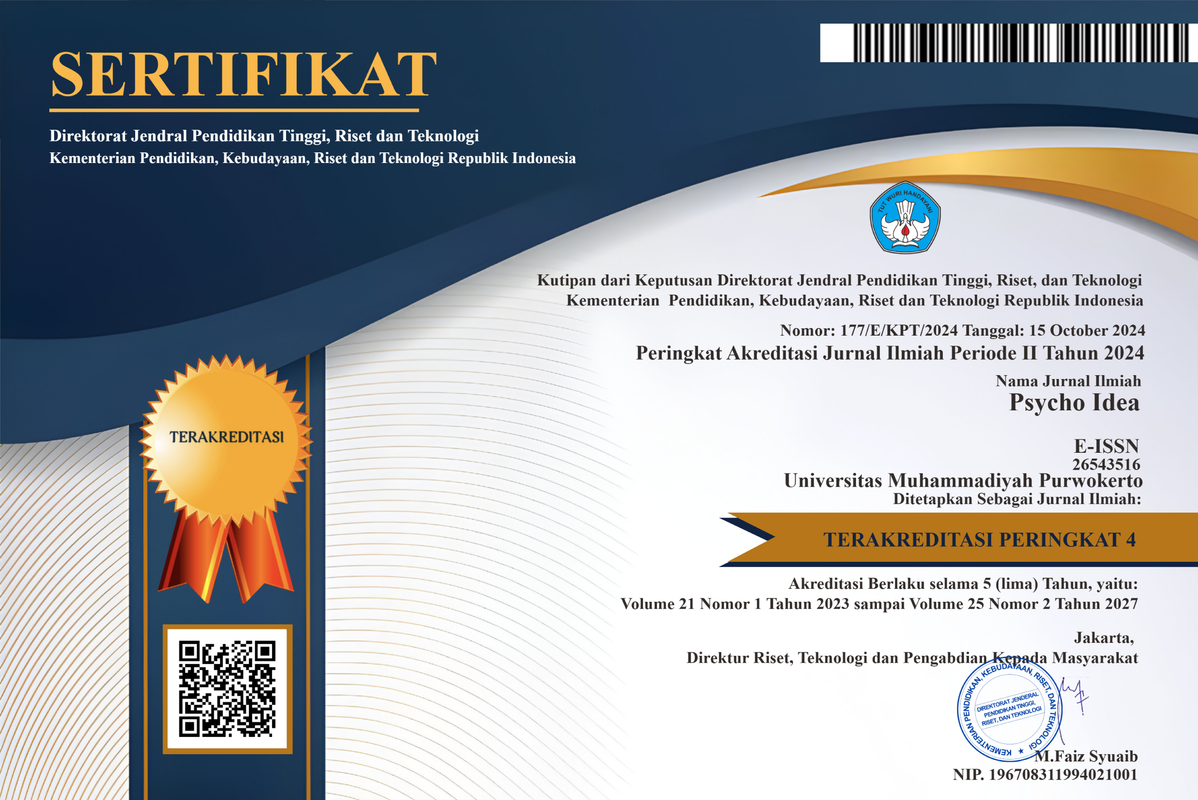STUDI TENTANG SUBJECTIVE WELL-BEING PADA PRIA PENDERITA DIABETES MELLITUS DI RSUD BANYUMAS
DOI:
https://doi.org/10.30595/psychoidea.v12i1.516Abstract
Penelitian ini bertujuan untuk mengkaji subjective well-being. Subjek penelitiannya adalah pria 5 penderita diabetes mellitus di RSUD Banyumas dan 5 orang terdekatnya. Metode pengumpulan datanya menggunakan wawancara dan observasi. Temuan penelitiannya: subjective well-being pada pria penderita diabetes mellitus adalah berusaha tetap berguna untuk keluarga dan orang-orang disekitar, aktif dalam kegiatan dalam masyarakat, memiliki kemampuan memahami keadaan dengan berusaha taat pada peraturan dokter, memiliki pengetahuan tentang penyakit yang dialami, sabar dan ikhlas dalam menjalankan kehidupan, berpartisipasi dalam kehidupan sosial, bercerita dan memberitahukan keadaan kepada orang-orang disekitar, menerima dan memberikan saran kepada orang lain, memiliki harapan di masa depan, berusaha mencoba berbagai macam pengobatan, memiliki harapan untuk mencapai kesehatan kembali, tetap menjalin silahturahmi dengan orang-orang disekitar, memberikan nasihat kepada orang lain, berserah diri kepada Tuhan dengan rajin beribadah dan yakin pada kekuasaan Tuhan. Kata kunci : Subjective well-being, men, people with diabetes mellitusReferences
Ariati, J. 2010. Subjective well-being (Kesejahteraan Subjektif) dan Kepuasan Kerja pada Staf Pengajar (Dosen) di Lingkungan Fakultas Psikologi Universitas Diponegoro. Jurnal Psikologi Universitas Diponegoro
Compton, William C., 2005. Introduction to Positive Psychology. Australia : Thomson Wardseorth.
Diener et al., 1999. Subjective Well-Being : Three Decades of Progress. Psychological Bulletin Vol.125. American Psychological Assosiation.
Diener, ED. 1984. Subjective Well-Being. Psychological Bulletin Vol. 95. American Psychological Assosiation
Diener, ED., Chan, Micaela Y.2011. Happy People Live Longer : Subjective Well-Being Contributes to Health and Longevity. Journal Appled Psychology : Health and Well-Being
Moleong, Lexy J., 2000. Metodologi Penelitian Kualitatif. Bandung : PT Remaja Rosdakarya.
Downloads
Published
Issue
Section
License
Authors published in this journal agree to the following terms:
- The copyright of each article is retained by the author (s) without restrictions
- The journal allows the author(s) to retain publishing rights without restrictions
- The author grants the journal the first publication rights with the work simultaneously licensed under the Creative Commons Attribution License, allowing others to share the work with an acknowledgment of authorship and the initial publication in this journal.
- Authors may enter into separate additional contractual agreements for the non-exclusive distribution of published journal versions of the work (for example, posting them to institutional repositories or publishing them in a book), with acknowledgment of their initial publication in this journal
- Authors are permitted and encouraged to post their work online (For example in the Institutional Repository or on their website) before and during the submission process, as this can lead to productive exchanges, as well as earlier and larger citations of published work
- Articles and all related material published are distributed under a Creative Commons Attribution-4.0 International Public License (CC - BY 4.0).
License
Psycho Idea is licensed under a Creative Commons Attribution- 4.0 International Public License (CC - BY 4.0).
You are free to :
Share — copy and redistribute the material in any medium or format
Adapt — remix, transform, and build upon the material for any purpose, even commercially











